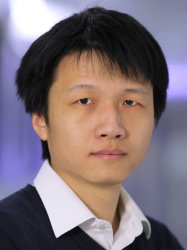Overview
My work is focusing on developing micro-electronics techniques, especially CMOS integrated circuits for low power low noise interface in biomedical applications. By scaling the physical dimension of a sensory or actuator system, sensitivity and functionality can be greatly improved with minimised parasitic due to localised sensing and stimulation. It also enhances the mobility of the instrumentation, making wearable or implantable devices possible. Lab-on-a-chip and implantable neural interface are good examples to demonstrate the impact of scaling. These, however, require miniaturised interface systems to maintain a high signal to noise ratio with minimised resource consumption (e.g. power, size). Therefore micro-electronic techniques have been proved to be a successful candidate for both applications. A summary of my research interests are listed below:
1. Low power low noise mix-mode circuits.
2. Continuous-time asynchronous data converters.
3. Bio-inspired neural signal processing.
4. CMOS based Lab-on-chip systems.
ADVANCED NEURAL INTERFACE
I have mainly been involved with NGNI and CANDO projects, which target to develop advanced neural interface for instrumentation or prosthesis.
LOW POWER LOW NOISE ANALOGUE FRONT END
Circuit techniques and system design are critical to realize low power and low noise analogue front end for neural interface. To sense 100 channel of uV level signal with uW power consumption is challenging even with advanced CMOS process. This requires good engineering effort but also a novel circuit and system implementation.
MULTI-MODAL INTEGRATED NEURAL INTERFACE
While electrophysiological signal are picked, electrical stimulation is commonly used for feedback to the neural system in neural-prosthesis. Optical power can also stimulate the neurons with optogenetic technology, providing multi-modal stimulation with different dimension and reduce the cross-talk.
BIO-INSPIRED NEURAL SIGNAL ACQUISITION AND PROCESSING
With 100s or even 1000s neural recording channels, power and hardware resource required to convert, transmit, decode these neural signal increase linearly and could easily exceed the limit of hardware resource within wearable devices. It is necessary to learn from nature, the neural network itself, which process and transmitter event with highest efficiency.
ADVANCED CMOS LAB-ON-A-CHIP
I also have been working on CMOS Lab-On-a-Chip since my PhD work. This includes ISFETs based chemical sensing system, novel time-based chemical sensing system and high bandwidth impedance-spectroscopy.

